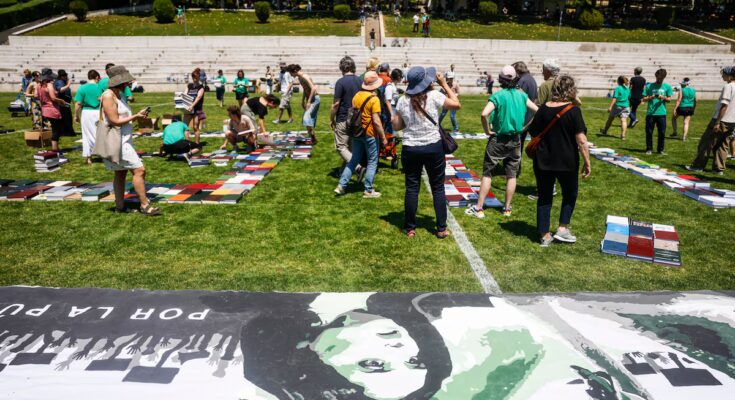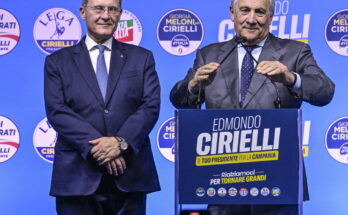The Complutense University will pay 4.4 million euros in interest to the people of Madrid for the loan of 34.46 million that it had to ask for from the regional government to meet end-of-year salaries and suppliers. It ended 2024 with a budget deficit of 33.19 million. Madrid is the community that finances the least per student in Spain, despite being the richest region. “Evidently it is very sad to ask your administration for a loan,” reflected the rector Joaquín Goyache in the last Government Council.
Between 2026 and 2029, every 30 September the UCM will pay 965,138 euros in interest and in 2030, the last year, 462,569. In its economic-financial plan the university tried to lower the conditions, inserting a “future income” item in which an improvement was expected, but the regional council refused. Since 2007, regional payroll transfers have grown by 5% and inflation by 44%.
The rectorate did not want to share the details of the loan, but the trade union of the General Confederation of Labor (CGT) did so in an email sent to the university community: the loan is for five years, has a grace period of three years and a fixed annual interest of 2.8%. Other sources confirm the data. Presumably UCM asked for these 34.46 million (38.46 with interest) from the Community because it enjoys better conditions than private banking.
From July 2024 the spending credit has been withheld. First at 30% and now at 35%. This means, in effect, that the deaneries and departments have a third less of the sum. A real drain on already severely decimated budgets. The vice-rector for Economic Affairs, Begoña García Greciano, explained in the last Government Council, last October, that through “spending containment and personnel policy” it is expected to reduce the deficit by 36% this year and in 2026, by 9% in 2027 and by 22% in 2028.
This “personnel policy”, explained the vice-rector, consists in reducing the temporality of PTGAS (administrative and service personnel) ―saving on social security expenses― and in not filling vacant positions in departments with many professors. Furthermore, they will opt for more permanent training courses and aspire to earn more revenue from their facilities.
“What in the rector’s report they call ‘rationalization of personnel expenses’ is what, in our opinion, indicates the freezing of hiring in the face of retirements expected in the coming years, which will mean an increase in the overloads from which the workforce already suffers”, complains the CGT in its statement.
The UCM chose to hire doctoral assistants – the lowest step towards stabilization after reading the thesis – with the María Goyri program, so as not to improve the conditions for being a full professor or full professor. “Of course we will stabilize all accredited assistant physicians. This will undoubtedly have consequences on the rest of the numbers. But I think we have to work for the future,” Goyache argued in the council. The union is not convinced. “There is an intensification of the precariousness of the salary and working conditions of university staff. However, the rector asks us to thank him for his management because, at least, we are told, ‘there will be no dismissals’. But if they do this to us in times of prosperity, what won’t they do in times of crisis?”, we read.
A year and a half ago, UCM recovered its 2012 teaching capacity, according to Goyache. “The bad thing is that I was unable to make the Community of Madrid understand that we must continue to work and that, to provide relief to those who are retiring, we cannot keep the accounts stable. Then there would be departments that would disappear. Literally. This is putting a strain on me and the university. But I could not allow the university to die. If we had not incorporated more than 800 people in the last few years, this university would have disappeared.”
Principals’ statement
Last Friday, the 26 deans read a statement at the door of the government headquarters in Madrid: “The current funding model is clearly insufficient for this purpose, since it does not cover the real costs of operation, which poses significant difficulties for the sustainability and quality of the university system.” Four of them were then received by the Vice Minister of University, Mercedes Zarzalejos. The university community has called a strike for 26 and 27 November and will hold 46 lessons in the street to raise awareness in society about their work and their extreme precariousness. The university is back on the streets, as in 2012, then in the midst of the economic crisis and now in the boom years.
The opposition is not convinced about the loan. “It is impossible to repay in these conditions: either it is forgiven or the UCM goes bankrupt. It is a patch that does not solve the structural problem, caused by underfunding,” says Juan Varela-Portas de Orduña, representative of Más Madrid and one of its professors. “The 34 million must come from the emergency fund and the regional government must now propose a master plan for sufficient funding of public universities. There is no other option.”
“If there is no budget now, repaying the loan with a similar budget is impossible,” reasons the socialist deputy Esteban Álvarez. “Credit will only serve to aggravate the situation, unless additional income is obtained from the sale of real estate, land… That is, by alienating the assets. There is no other option. It is an exercise in cynicism of the first order: first I will suffocate you and then I will put conditions on you that you cannot refuse.”



